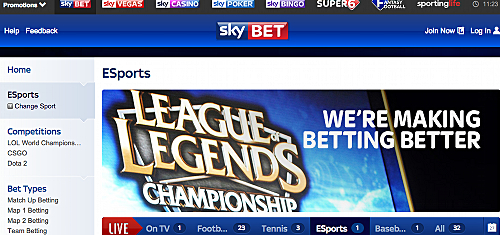 UK online gambling operator Sky Betting & Gaming has become the first operator to integrate Betgenius’ new eSports betting product.
UK online gambling operator Sky Betting & Gaming has become the first operator to integrate Betgenius’ new eSports betting product.
This week, Sky Betting & Gaming launched its new eSports betting product thanks to a new partnership with Betgenius. Earlier this month, Betgenius claimed an industry first via the launch of its new comprehensive eSports betting product, which allows operators the ability to offer a multitude of pre-game and live betting markets on major eSports titles, including League of Legends, Counter Strike: Global Offensive and Dota 2.
On Wednesday, eGaming Review quoted Sky Betting & Gaming’s head of sports trading Ben Wright saying the company saw “great potential” in the burgeoning eSports market. Wright said the partnership with Betgenius was a key plank of Sky Betting & Gaming’s vision of “making better better.” Betgenius CEO Mark Locke logrolled back, calling Sky Betting & Gaming “a critical partner in our journey to success.”
FIVE KEYS TO ESPORTS FUTURE GROWTH
Earlier this year, market researchers Newzoo estimated the revenue of each eSports fan to be worth $2.22. On Tuesday, Newzoo boosted this figure to $2.40 and conservatively projected that the sum will rise to $4.63 by 2018. By comparison, basketball is worth $14m per enthusiast on a global basis, rising to $19 when you narrow it down to just NBA fans.
Newzoo also laid out five factors it believes will determine the pace of eSports growth. The first factor is the diversity of game genres. Newzoo says that while MOBA (multiplayer online battle arena) games currently dominate eSports, their complex narratives can be confusing to eSports novices. Newzoo suggests that first-person shooter games like the popular Call of Duty franchise – which launched a new global eSports league last week – could offer an easier entry point for eSports noobs.
The second factor is the geographic expansion of leagues. Newzoo believes more eSports leagues need to adopt the regional hierarchal structure established by League of Legends, although this will require support from sponsors and sports associations to help establish local tournaments.
Regulation of competitions will also play a key role if concerns over cheating, match fixing and the use of performance enhancing drugs are to be mitigated. Regulation advocates are pushing for tracking all in-game data and using software to detect suspicious irregularities in player performance, although getting the traditionally nonconformist eSports practitioners to submit to new restrictions and/or pee in a cup before and after matches could prove difficult.
Media rights ownership could present a stumbling block, as eSports game publishers have yet to clamp down on fan-filmed/streamed videos, seeing them as effective promotional tools. Newzoo cautions that this scenario could change as more traditional broadcasters hop on the eSports bandwagon and publishers look to establish more exclusivity over their content. The sale of media rights on a country-by-country basis may also prove challenging, given eSports existing structure.
The alignment of digital and traditional media is also uncharted territory for eSports. Although more and more traditional sports broadcasters are viewing eSports as just another programming option, resistance by some executives and their more traditional viewers remains strong.
